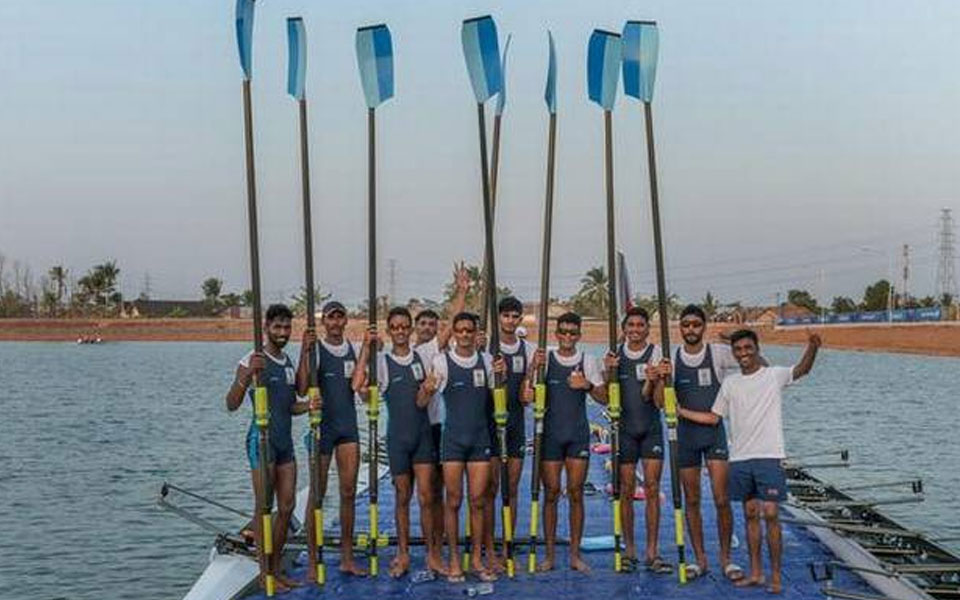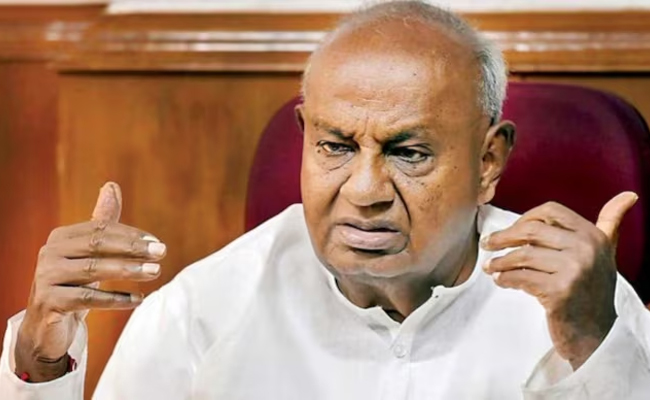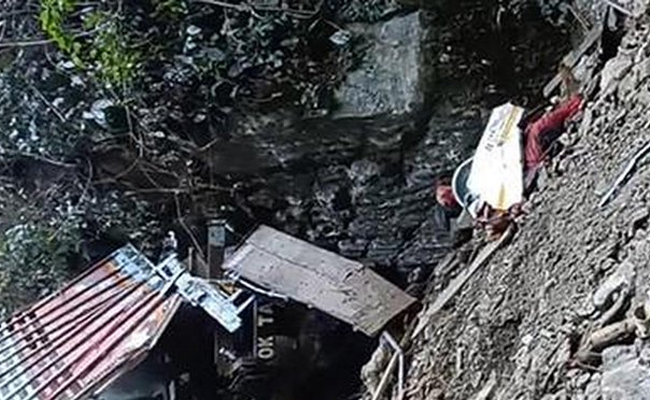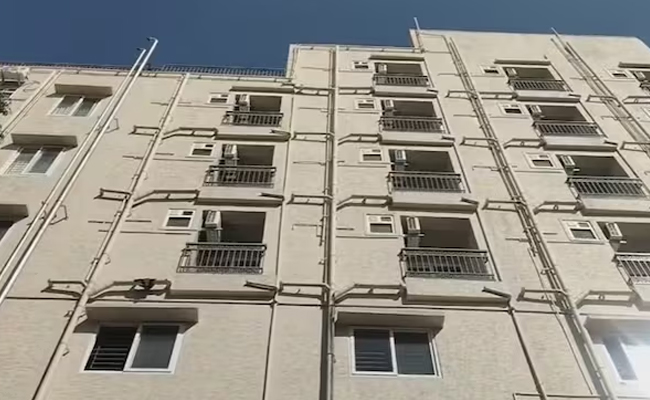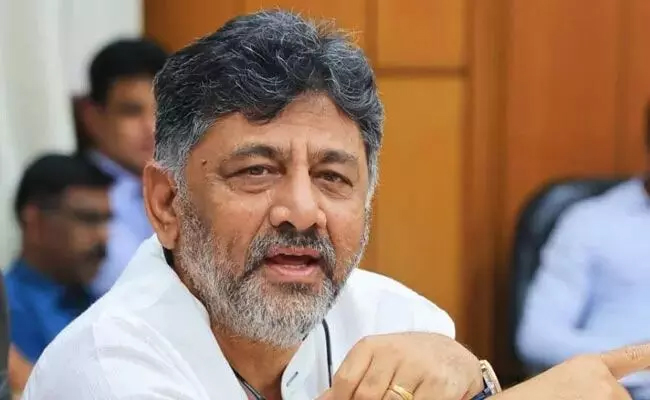Jakarta, Aug 24 : Indian rowers Sawarn Singh, Dattu Bhokanal, Om Prakash and Sukhmeet Singh came up with a superb performance to win gold in the men's quadruple sculls category at the 18th Asian Games here on Friday.
This is only the second gold for India since they started participating in the rowing events at the Asiad. The first was won by Bajrang Lal Takhar in men's singles sculls at the 2010 Games.
The Indian team clocked a time of 6 minutes and 17.13 seconds while hosts Indonesia clocked 6:20.58 to take the silver. Thailand had to be content with the bronze at 6:22.41.
The other Indian rowers in the men's section also enjoyed a successful day with bronze medals coming in the lightweight single sculls and lightweight double sculls categories.
Dushyant started India's campaign on the sixth day of the Asian Games on a positive note by bagging the bronze medal in the men's lightweight single sculls final.
The 25-year-old, who had also clinched a bronze at the 2014 Asiad, clocked a time of 7 minutes and 18.76 seconds to finish the competition at the third place.
South Korea's Hyunsu Park (7 minutes and 12.86 seconds) secured the gold while Hin Chun Chiu (7 minutes 14.16 seconds) bagged silver.
India bagged another bronze when Bhagwan Singh and Rohit Kumar finished third in the men's lightweight double sculls final. Clocking a time of 7 minutes 04.61 seconds, the Indian pair were at the third place in the finals.
The Japanese pair comprising Masayuki Miyaura and Masahiro Takeda secured gold, while Byumhoon Kim and Minhyuk Lee of South Korea clinched silver.
But the Indian women's four team turned out to be a disappointment as they finished sixth and last in the final. Continental powerhouse China won gold with 7:05.50 while Vietnam (7:14.52) and Indonesia (7:19.02) took silver and bronze respectively.
Let the Truth be known. If you read VB and like VB, please be a VB Supporter and Help us deliver the Truth to one and all.
New Delhi (PTI): Former Prime Minister H D Devegowda on Monday said the Opposition parties would "suffer" if they continue to raise allegations of "vote chori" and create suspicion in the minds of voters by blaming Prime Minister Narendra Modi-led government.
Participating in a discussion on election reforms in the Rajya Sabha, he criticised the Opposition for making a mockery about the Prime Minister "in the streets and on the public platform".
"This (India) is a very big country. A large country. Congress may be in three states. Remember my friends please, by using the words 'vote chori' you are going to suffer in the coming days. You are not going to win the battle," Devegowda said, referring to the Opposition members.
He asked what the Opposition is going to earn by "blaming Narendra Modi's leadership and creating a suspicion in the mind of the voters" through the claims of "vote chori".
"What has happened to their minds? Let them rectify," Devegowda said.
ALSO READ: Search operation ends in Anjaw truck accident, 20 bodies recovered
The former prime minister said that during his over seven decades of public life, he has never raised such issues of vote theft despite facing defeat in elections.
He also cited a letter written by the then Prime Minister Jawaharlal Nehru regarding inclusion of "18,000 votes" (voters) in Kerala.
"Why I am telling this (because) during the Nehru period also, there were certain lapses in the electoral system," said Devegowda, who was the prime minister between June 1, 1996 and April 21, 1997.
He said that the Congress party faced defeat in the recent Bihar elections despite raising the issues of mistakes in the electoral rolls.
"What happened after that even after so much review (of voters list). Think (for) yourself! You got six MLAs," the senior Janata Dal (Secular) leader said.
Devegowda questioned the Opposition as to why they want to make allegations against the prime minister on the issue of the voters list?
"Election Commission is there. Supreme Court is there. The Election Commission has given direction to all the state units to rectify all these things," he said.
Devegowda said people of the country have full confidence in Narendra Modi's government and it will come back to power after the next Lok Sabha elections as well.
K R Suresh Reddy, Bharat Rashtra Samithi (BRS) party's Rajya Sabha member from Telangana, said that electoral reforms are the backbone for a healthy democracy.
He said a large and diverse nation like Indi needs clean electoral rolls.
Asserting that strict re-verification should not become a mechanism for exclusion, Reddy said no eligible voter should lose their right to vote simply because accessing paperwork is difficult.
He said while the concern definitely is on the voters' exclusion, "we should also be equally concerned about the percentage of voting."
"What is happening in voting today? Once the election ends, the drama begins. The biggest challenge that the Indian democracy has been facing in spite of two major Constitutional amendments has been the anti-defection. Anti-defection is the name of the game today, especially in smaller states, especially where the legislatures are small in number," Reddy said.
The senior BRS leader suggested creation of a parliamentary committee "which would constantly look into the defection" and "ways and means to cutting that".
AIADMK's M Thambidurai raised the issues related to election campaigning.
ALSO READ: National Herald case: Shivakumar to seek time next week to appear before Delhi police
"Election campaigns are one of the important election processes. In that, political parties must be given the proper chance to campaign," he said and cited problems faced by his party in Tamil Nadu in this regard.
Thambidurai said political parties were facing hardships in Tamil Nadu to conduct public meetings and to express their views to the public.
YSRCP's Yerram Venkata Subba Reddy stressed on bringing electoral reforms at both the state and national levels.
He also suggested replacing Electronic Voting Machines with paper ballots in all future elections.
"EVM may be efficient but can't be trusted. Paper ballot may not be efficient but can be trusted. You need trust in democracy," Reddy added.

